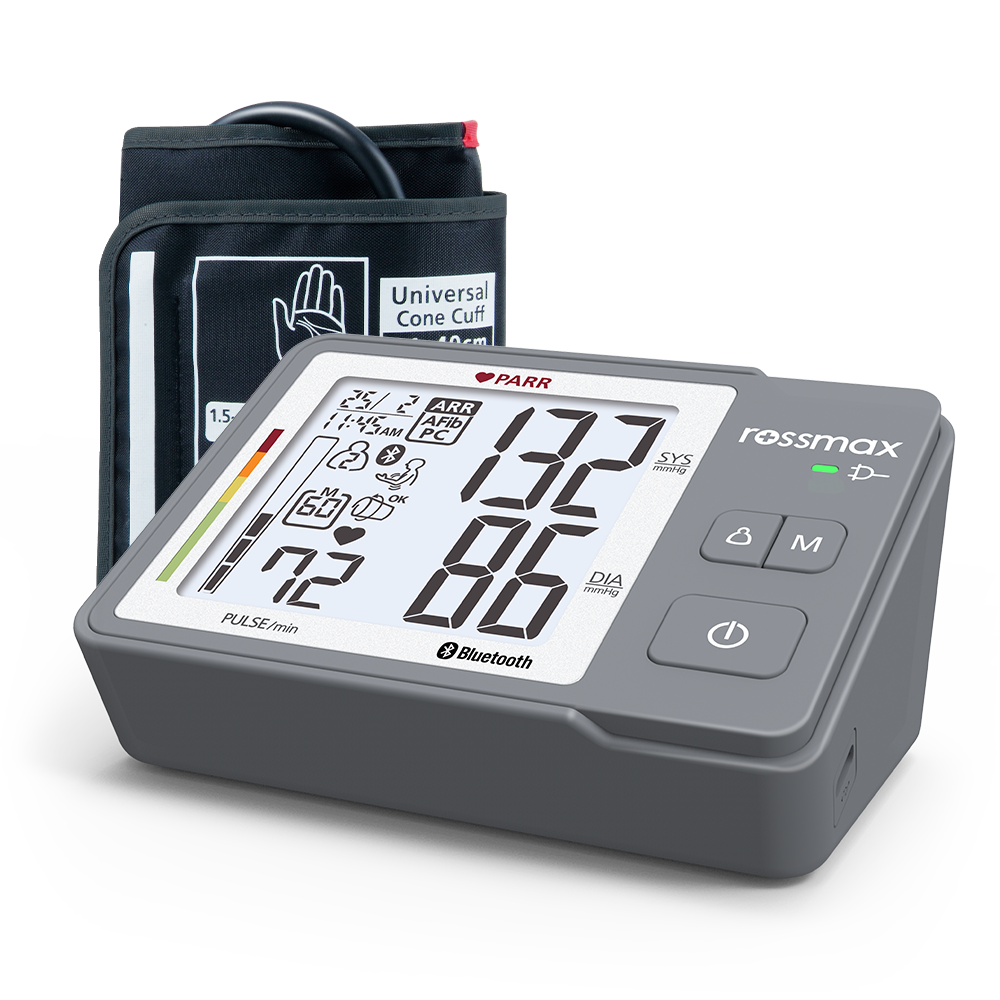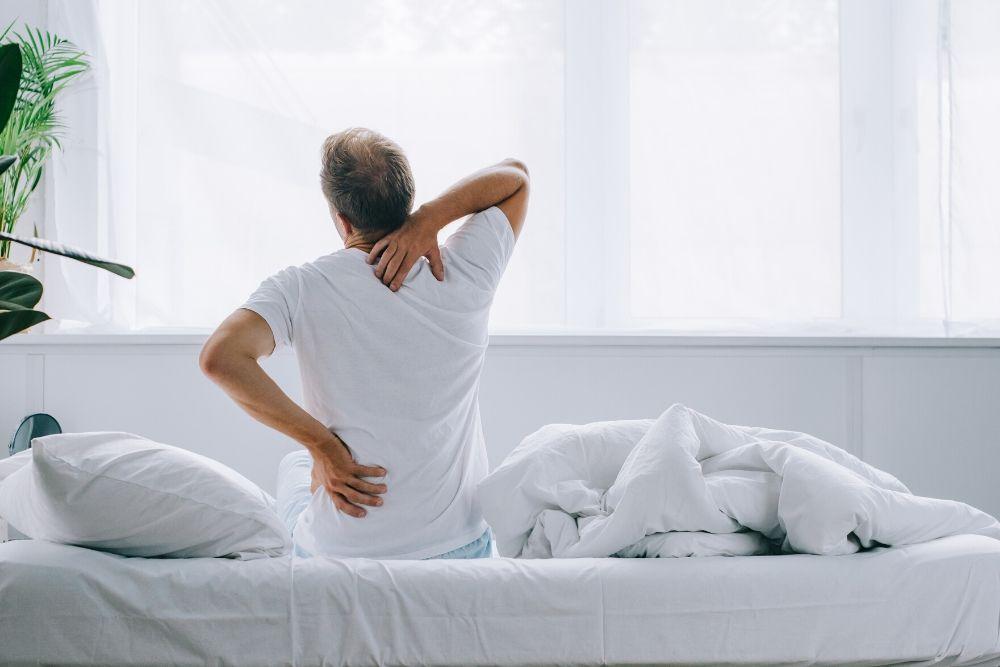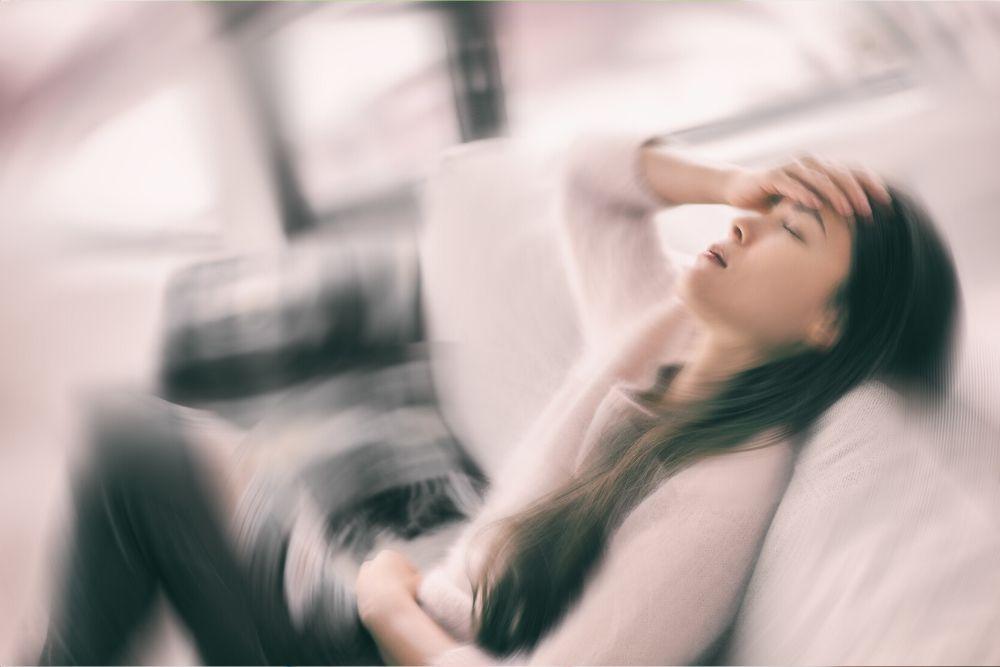Low blood pressure
symptoms of dizziness and weakness
ACCURATE MEASUREMENTS
Low blood pressure - symptoms of dizziness and weakness
Does it peak to get up when you get up or is you feeling powerless otherwise? When was the last time you measured your blood pressure? Low blood pressure may be the cause of shaky feeling.
The good news is that unlike high blood pressure, low blood pressure is considered to be quite a beneficial condition for health. After all, high blood pressure if left untreated can lead to stroke, heart failure, heart attack and coronary heart disease, among other things.

Rossmax Z5/X5 Blood Pressure Monitor
Detects arrhythmia in connection with quick and easy blood pressure measurement, and accurately distinguishes between atrial fibrillation and extra beats.
After all, high blood pressure if left untreated can lead to stroke, heart failure, heart attack and coronary heart disease, among other things.The symptoms of low blood pressure are more life-threatening. The most common symptoms are:
-
dizziness, especially when standing up
-
vapors
-
blurring of the eyes
-
fainting
-
cold sweat
-
shortness of breath if there is not enough fluid in the bloodstream
-
accelerated heart rate
-
impotency
-
bad feeling
If the above functions cannot be performed by the person, the emergency number must be called immediately. In the case of a cerebral infarction, dissolution therapy should be initiated as soon as possible. The sooner treatment is started, the greater the benefits.
The hospital is the first to determine if there is a cerebral infarction, as cerebral infarction and cerebral hemorrhage can cause similar symptoms. With brain imaging studies, they can be distinguished from each other. In addition, other studies are being conducted to find out the cause of the stroke.
Affects people of different ages in different ways
Low blood pressure values
Ideal blood pressure is defined as less than 120/80 mmHg. The reference values for low blood pressure are not completely unambiguous. Low blood pressure is when the upper pressure is 100 millimetres of mercury (mmHg) or lower.
The negative pressure, in turn, can be less than 70 millimetres of mercury. Blood pressure can be as high as 75-80 / 50-60 mmHg without being a sign of disease.
Low blood pressure affects people of different ages in different ways. Healthy and young or middle-aged people do not have to worry about even low blood pressure levels. For example, young women 90/60 have a completely normal blood pressure reading and need not cause any problems.
Low blood pressure affects people of different ages in different ways.
In addition, it is worth noting that at night, blood pressure drops and the drop can be as much as 20-25 percent. The fact that blood pressure does not drop at night is rather a sign of a problem.
When measuring blood pressure, it is good to keep in mind that an automatic monitor may show a false low result if your heart rhythm is uneven. The cause may be, for example, atrial fibrillation. It is advisable to choose a high-quality blood pressure monitor because it detects atrial fibrillation and its measurement result is very reliable.
In the elderly, low blood pressure is more likely to cause problems. In many, blood pressure drops to stand up so much that it causes short-term dizziness. This is called orthostatic hypertension, which is a drop in blood pressure associated with an upright position. The decrease in blood pressure is due to the fact that the stiffened arteries do not have time to adapt quickly enough to changes in posture. That’s why it’s worth learning to get out of bed calmly. Especially in the morning after a long rest.
In the elderly, low blood pressure is more likely to cause problems. In many, blood pressure drops to stand up so much that it causes short-term dizziness. This is called orthostatic hypertension, which is a drop in blood pressure associated with an upright position. The decrease in blood pressure is due to the fact that the stiffened arteries do not have time to adapt quickly enough to changes in posture. That’s why it’s worth learning to get out of bed calmly. Especially in the morning after a long rest.

If you feel dizzy when you get out of bed, you should sit in bed for a moment.
Learning to get out of bed calmly
-
When you get out of bed, first get up calmly to sit on the edge of the bed.
-
Wait in a sitting position for half a minute to a minute for your body to get used to the change.
-
After waiting, get up calmly and get support if needed.
Do you suspect your blood pressure will drop sharply when you get up? You can check it with a home monitor. First, measure your blood pressure normally. Then, stand up and measure after half a minute of standing blood pressure again. If your blood pressure drops by more than 20 notches and dizziness when you get up, the cause of the trouble is probably too low blood pressure.If you feel dizzy when you get up from the bed, you should sit in bed for a moment in peace.
Medications can also lower blood pressure
The cause of low blood pressure in the elderly needs to be determined
There can be a variety of causes for low blood pressure in the elderly, such as some cardiovascular disease. Such heart disease may be, for example, heart failure. As it progresses, heart failure causes low blood pressure because the heart cannot pump blood. Disease-related medications can also lower blood pressure.
An elderly person's low blood pressure can also be caused by a vascular disease. Some antihypertensive drugs can cause a rapid drop in blood pressure when standing. In general, however, this is not dangerous. In addition, problems with blood flow regulation cause low blood pressure, which can lead to a person fainting.
If the elderly has low blood pressure caused by a metabolic disorder, it is not the only symptom of the disease. Other symptoms include severe fatigue and severe weakness. In any case, it is worth investigating the causes of low blood pressure in the elderly. Other diseases of an elderly person may be due to fragility-splinter syndrome or Addison's disease. There also seems to be a link between low blood pressure and dementia. Researchers say dementia is more likely to cause low blood pressure than vice versa.
It may also be appropriate to check whether low blood pressure may be associated with medications such as dehydration medication. In particular, over-medication and concomitant use of multiple drugs may be affected. It is then advisable to investigate whether the medication can be dismantled or the medications can be replaced with other medications.
If the elderly has low blood pressure caused by a metabolic disorder, it is not the only symptom of the disease. Other symptoms include severe fatigue and severe weakness. In any case, it is worth investigating the causes of low blood pressure in the elderly. Other diseases of an elderly person may be due to fragility-splinter syndrome or Addison's disease. There also seems to be a link between low blood pressure and dementia. Researchers say dementia is more likely to cause low blood pressure than vice versa.
It may also be appropriate to check whether low blood pressure may be associated with medications such as dehydration medication. In particular, over-medication and concomitant use of multiple drugs may be affected. It is then advisable to investigate whether the medication can be dismantled or the medications can be replaced with other medications.
Negotiate your situation with health professionals
Low blood pressure can be prevented
Although low blood pressure is not usually dangerous, the symptoms it causes can be troublesome. However, there are two approaches to increasing salt use. According to other guidelines, the use of salt can be increased moderately. In the opposite direction, it is not recommended to increase salt intake, as the overall harm to the body is considered to outweigh the benefit of the increase in blood pressure. It is probably wisest to negotiate your own situation with health professionals. Treating low blood pressure with medication is quite tricky.
In some cases, your doctor may prescribe a medicine that acts like your body's salt hormone. Vasoconstrictors can also be tried, but they may not work as well as desired. Symptoms caused by low blood pressure can make life difficult.

Symptoms caused by low blood pressure can make life difficult.
Ways to prevent low blood pressure
Although low blood pressure is not usually dangerous, the symptoms it causes can be troublesome. There are some ways to prevent low blood pressure:
-
Rest enough
-
Drink (especially water) enough.
-
Eat regularly.
-
Keep your blood sugar in balance.
-
In severe cases, use support socks.
-
Increase the use of salt and / or salmia.
Increased risk of heart disease
A low diastolic pressure may not be just a good thing
In general, low blood pressure is considered a good and health-promoting thing. However, a couple of extensive studies have shown that too low a vacuum is not good for health.
The problem is that low vacuum does not cause any symptoms, so it may not be noticed.
The studies found that people with a vacuum of 60-69 mmHg had twice as much damage to their heart as those with a vacuum of 80-89 mmHg. Lower pressures also appeared to be associated with an increased risk of heart disease and overall mortality.
Low diastolic pressure does not cause any symptoms.
Similarly, another large study found that both high hypertension (above 140 mmHg) and low blood pressure (below 120/70 mmHg) were associated with a higher risk of heart attack, hospital-induced heart failure, or death over the next five years. According to this study, the optimal blood pressure is 120-139 / 70-79 mmHg.
According to these studies, it is not advisable to aim for the lowest possible blood pressure, and when lowering high blood pressure, it is important to monitor the values of low blood pressure.
Monitor blood pressure levels at home
It is wisest to monitor your own blood pressure with regular measurements. In young people, low blood pressure is not usually a problem, but the cause of low blood pressure in older people is still worth finding out.
Medication for the treatment of low blood pressure should be discussed with your healthcare professional, as well as a possible small increase in salt or salmon use.

